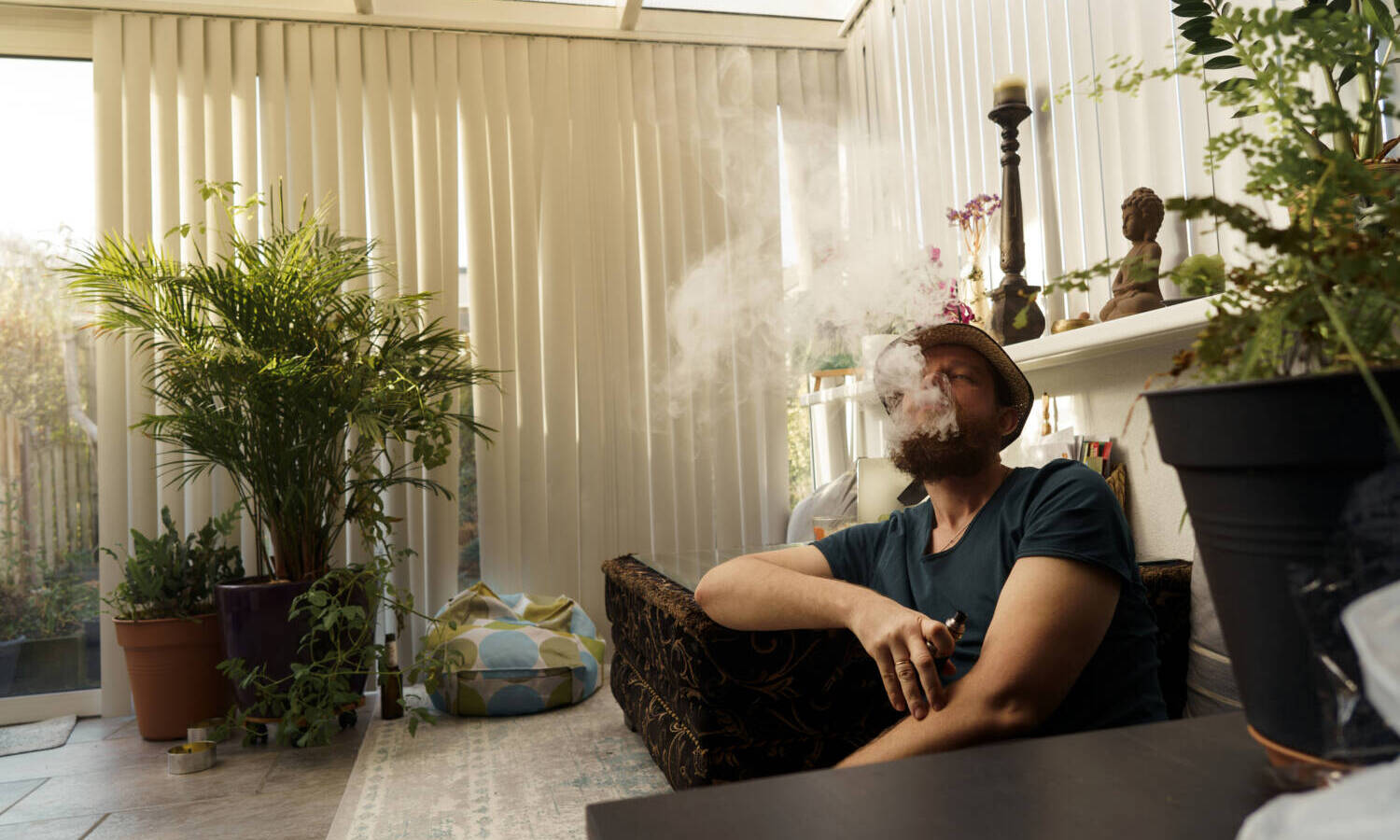Government
Clear The Air: Weed Etiquette For Roommates

There are some drawbacks to living with another person, especially if you two do not live similar lifestyles or have different views on cannabis usage in the home. Here’s how to deal with it.
Marijuana legalization has liberated those who regularly use cannabis and live in states where it has recently become legal. While recreational marijuana has eliminated a lot of difficulties and roadblocks for those who indulge in smoking weed, it has created some new challenges, and magnified a few existing conflicts. One area that has grown increasingly more complicated is weed etiquette in the home when you have a roommate.
Having a roommate certainly has its pros and cons: they split your rent, walk your dog, and listen to you when you have something (or nothing at all) to say. There are, however, some drawbacks to living with another person, especially if you two do not live similar lifestyles or have different views on cannabis usage in the home. If you have a roommate, this might have you wondering what proper weed etiquette is these days now that we are in this new age of cannabis freedom.
Check the Lease
Before you start wondering what is polite or impolite, you should first determine what is allowed and what is prohibited in your rental. More and more properties have very clear smoking policies. No-smoking policies do not simply refer to cigarettes. They can also apply to marijuana, and do not necessarily have to specify the type of smoke, as long as they are specific about the rules.

According to the legal website Nolo, “A clear no-smoking policy prohibits all forms of smoking, including smoking marijuana for medical reasons.” These no-tolerance smoking policies are quite serious.
If you signed the lease and agreed to no-smoking terms, the violation can land you on the street. “A landlord who has included a no-smoking policy in a lease or rental agreement can terminate the tenancy of or evict a tenant who smokes,” the article continues. Make sure you are aware of your lease and its fine print, especially if you have a roommate or neighbor who is likely to rat you out to your landlord for smoking.
Keep Things Ventilated and Prevent Secondhand Smoke
Once you establish what is allowed and what is forbidden, you can move on to the “should” and “should nots” of smoking weed when you have a roommate. One thing you should always make sure of before sparking up a joint in your home is proper ventilation. Proper ventilation will prevent smoke from circulating throughout the home. The best policy is to smoke by an open window with a fan on.
This is important, as your roommate might be worried about secondhand marijuana smoke. Getting high or failing a drug test from secondhand smoke is unlikely unless you are in a sealed room with lots of marijuana smoke. Even so, that does not mean a strong scent won’t upset or worry your roommate – especially if he or she may need to pass a drug test at some point.
According to Healthline, “catching a whiff of marijuana fragrance through your apartment window or entering a room where people were smoking several hours ago is very unlikely (maybe even impossible) to affect you at all.” So proper ventilation, and keeping the smoke flowing out the window as much as possible will help keep things safe and calm.

Kill the Smell
Ventilation also helps get rid of the smell, and the smell can be the biggest gripe from a roommate who doesn’t smoke weed. If marijuana smell and usage is causing friction in the home, do your best to eliminate the issue. The odds are, the smell of weed and accessories are the main source of frustration from your roommate. Keeping your weed and accessories stashed in your room out of sight is always the best policy to keep the home looking (and smelling) great for everyone.
As we have previously reported, there are all sorts of ways to get rid of and hide the smell of weed, from fragrance sprays to open windows.
Remember that even if weed is legal in the state where you live, it doesn’t mean you should be hotboxing your apartment, especially if you have roommates. If marijuana smoke is a point of contention between you and your roommate, consider alternatives like vaping or edibles. After all, marijuana should alleviate the stress in your life, not cause it.
Source: https://thefreshtoast.com/how-to/clear-the-air-weed-etiquette-for-roommates/
Business
New Mexico cannabis operator fined, loses license for alleged BioTrack fraud

New Mexico regulators fined a cannabis operator nearly $300,000 and revoked its license after the company allegedly created fake reports in the state’s traceability software.
The New Mexico Cannabis Control Division (CCD) accused marijuana manufacturer and retailer Golden Roots of 11 violations, according to Albuquerque Business First.
Golden Roots operates the The Cannabis Revolution Dispensary.
The majority of the violations are related to the Albuquerque company’s improper use of BioTrack, which has been New Mexico’s track-and-trace vendor since 2015.
The CCD alleges Golden Roots reported marijuana production only two months after it had received its vertically integrated license, according to Albuquerque Business First.
Because cannabis takes longer than two months to be cultivated, the CCD was suspicious of the report.
After inspecting the company’s premises, the CCD alleged Golden Roots reported cultivation, transportation and sales in BioTrack but wasn’t able to provide officers who inspected the site evidence that the operator was cultivating cannabis.
In April, the CCD revoked Golden Roots’ license and issued a $10,000 fine, according to the news outlet.
The company requested a hearing, which the regulator scheduled for Sept. 1.
At the hearing, the CCD testified that the company’s dried-cannabis weights in BioTrack were suspicious because they didn’t seem to accurately reflect how much weight marijuana loses as it dries.
Company employees also poorly accounted for why they were making adjustments in the system of up to 24 pounds of cannabis, making comments such as “bad” or “mistake” in the software, Albuquerque Business First reported.
Golden Roots was fined $298,972.05 – the amount regulators allege the company made selling products that weren’t properly accounted for in BioTrack.
The CCD has been cracking down on cannabis operators accused of selling products procured from out-of-state or not grown legally:
- Regulators alleged in August that Albuquerque dispensary Sawmill Sweet Leaf sold out-of-state products and didn’t have a license for extraction.
- Paradise Exotics Distro lost its license in July after regulators alleged the company sold products made in California.
Golden Roots was the first alleged rulebreaker in New Mexico to be asked to pay a large fine.
Source: https://mjbizdaily.com/new-mexico-cannabis-operator-fined-loses-license-for-alleged-biotrack-fraud/
Business
Marijuana companies suing US attorney general in federal prohibition challenge

Four marijuana companies, including a multistate operator, have filed a lawsuit against U.S. Attorney General Merrick Garland in which they allege the federal MJ prohibition under the Controlled Substances Act is no longer constitutional.
According to the complaint, filed Thursday in U.S. District Court in Massachusetts, retailer Canna Provisions, Treevit delivery service CEO Gyasi Sellers, cultivator Wiseacre Farm and MSO Verano Holdings Corp. are all harmed by “the federal government’s unconstitutional ban on cultivating, manufacturing, distributing, or possessing intrastate marijuana.”
Verano is headquartered in Chicago but has operations in Massachusetts; the other three operators are based in Massachusetts.
The lawsuit seeks a ruling that the “Controlled Substances Act is unconstitutional as applied to the intrastate cultivation, manufacture, possession, and distribution of marijuana pursuant to state law.”
The companies want the case to go before the U.S. Supreme Court.
They hired prominent law firm Boies Schiller Flexner to represent them.
The New York-based firm’s principal is David Boies, whose former clients include Microsoft, former presidential candidate Al Gore and Elizabeth Holmes’ disgraced startup Theranos.
Similar challenges to the federal Controlled Substances Act (CSA) have failed.
One such challenge led to a landmark Supreme Court decision in 2005.
In Gonzalez vs. Raich, the highest court in the United States ruled in a 6-3 decision that the commerce clause of the U.S. Constitution gave Congress the power to outlaw marijuana federally, even though state laws allow the cultivation and sale of cannabis.
In the 18 years since that ruling, 23 states and the District of Columbia have legalized adult-use marijuana and the federal government has allowed a multibillion-dollar cannabis industry to thrive.
Since both Congress and the U.S. Department of Justice, currently headed by Garland, have declined to intervene in state-licensed marijuana markets, the key facts that led to the Supreme Court’s 2005 ruling “no longer apply,” Boies said in a statement Thursday.
“The Supreme Court has since made clear that the federal government lacks the authority to regulate purely intrastate commerce,” Boies said.
“Moreover, the facts on which those precedents are based are no longer true.”
Verano President Darren Weiss said in a statement the company is “prepared to bring this case all the way to the Supreme Court in order to align federal law with how Congress has acted for years.”
While the Biden administration’s push to reschedule marijuana would help solve marijuana operators’ federal tax woes, neither rescheduling nor modest Congressional reforms such as the SAFER Banking Act “solve the fundamental issue,” Weiss added.
“The application of the CSA to lawful state-run cannabis business is an unconstitutional overreach on state sovereignty that has led to decades of harm, failed businesses, lost jobs, and unsafe working conditions.”
Business
Alabama to make another attempt Dec. 1 to award medical cannabis licenses

Alabama regulators are targeting Dec. 1 to award the first batch of medical cannabis business licenses after the agency’s first two attempts were scrapped because of scoring errors and litigation.
The first licenses will be awarded to individual cultivators, delivery providers, processors, dispensaries and state testing labs, according to the Alabama Medical Cannabis Commission (AMCC).
Then, on Dec. 12, the AMCC will award licenses for vertically integrated operations, a designation set primarily for multistate operators.
Licenses are expected to be handed out 28 days after they have been awarded, so MMJ production could begin in early January, according to the Alabama Daily News.
That means MMJ products could be available for patients around early March, an AMCC spokesperson told the media outlet.
Regulators initially awarded 21 business licenses in June, only to void them after applicants alleged inconsistencies with how the applications were scored.
Then, in August, the state awarded 24 different licenses – 19 went to June recipients – only to reverse themselves again and scratch those licenses after spurned applicants filed lawsuits.
A state judge dismissed a lawsuit filed by Chicago-based MSO Verano Holdings Corp., but another lawsuit is pending.
Source: https://mjbizdaily.com/alabama-plans-to-award-medical-cannabis-licenses-dec-1/
-

 Business2 years ago
Business2 years agoPot Odor Does Not Justify Probable Cause for Vehicle Searches, Minnesota Court Affirms
-

 Business2 years ago
Business2 years agoNew Mexico cannabis operator fined, loses license for alleged BioTrack fraud
-

 Business2 years ago
Business2 years agoAlabama to make another attempt Dec. 1 to award medical cannabis licenses
-

 Business2 years ago
Business2 years agoWashington State Pays Out $9.4 Million in Refunds Relating to Drug Convictions
-

 Business2 years ago
Business2 years agoMarijuana companies suing US attorney general in federal prohibition challenge
-

 Business2 years ago
Business2 years agoLegal Marijuana Handed A Nothing Burger From NY State
-

 Business2 years ago
Business2 years agoCan Cannabis Help Seasonal Depression
-

 Blogs2 years ago
Blogs2 years agoCannabis Art Is Flourishing On Etsy



